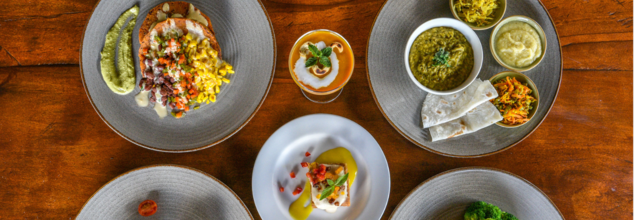
Ayurveda Diet To Combat Stress And Restore Clarity
Ayurveda Diet To Combat Stress And Restore Clarity
Ayurveda, the ancient Indian system of medicine, emphasizes the interconnectedness of mind, body, and spirit. It offers holistic solutions for modern problems, including stress and mental imbalance, through personalized diet plans. These diets are tailored to balance and restore harmony within the body and mind.
Stress is viewed in Ayurveda as a disruption of mental and physical equilibrium, often caused by an imbalance in the doshas.
Vata dosha imbalance may lead to anxiety, restlessness, and insomnia.
Pitta dosha imbalance can manifest as irritability, anger, and frustration.
Kapha dosha imbalance might result in lethargy, depression, or a lack of motivation.
The key to reducing stress lies in rebalancing these doshas through mindful eating, proper food choices, and lifestyle adjustments.
1. Eat According to Your Dosha Type
Vata- dosha calming diet: Include warm, moist, and grounding foods like cooked grains, root vegetables, and healthy fats. Avoid raw, cold, or overly dry foods.
Pitta- dosha pacifying diet: Focus on cooling, hydrating foods like cucumbers, leafy greens, and coconut water. Minimize spicy, sour, and overly salty foods.
Kapha-dosha soothing diet: Opt for light, spicy, and warming foods such as lentils, ginger tea, and steamed vegetables. Avoid heavy, oily, or sugary foods.
2. Incorporate Stress-Reducing Foods
Ayurveda recommends foods that calm the nervous system and nourish the mind like Ashwagandha which is an adapt genic herb known for reducing cortisol levels and enhancing resilience to stress, Tulsi (Holy Basil) which gives a calming effect and supports mental clarity and reduces anxiety, Turmeric which is a potent anti-inflammatory that improves mood and brain health.
Intake of Almonds and Walnuts which are rich in omega-3 fatty acids, boost brain function and reduce stress.
3. Follow a Consistent Eating Routine
Eat meals at the same time each day to regulate the digestive system. Avoid overeating or skipping meals, as both can disrupt mental balance.
4. Use Spices for Mental Calmness
Spices like cardamom, cinnamon, fennel, and saffron enhance digestion, uplift mood, and calm the mind.
Stress-Reducing Ayurvedic Recipes
1. Golden Milk (Turmeric Milk)
Warm milk (dairy or plant-based) mixed with turmeric, black pepper, and a dash of honey promotes relaxation and better sleep.
2. Khichadi (Detoxifying Comfort Food)
A combination of rice, mung dal, and spices like cumin, coriander, and ginger helps stabilize doshas and provides a soothing effect on the mind.
3. Herbal Teas
Chamomile, Tulsi, or licorice teas reduce anxiety and promote mental clarity.
Lifestyle Enhancements for Better Results
Mindful Eating: Focus on the texture, flavor, and aroma of your meals to enhance digestion and reduce stress.
Yoga and Meditation: Regular practice enhances the effects of an Ayurvedic diet by calming the mind.
Adequate Sleep: Follow the Ayurvedic principle of sleeping early to allow the body and mind to rejuvenate.
Undergoing Kerala Ayurveda Treatments like Shirodhara, Pizhichil (hot oil bath), Head massage etc. will help to calm down the mind and helps in rejuvenation of body by expelling out all the toxins from the body.
An Ayurveda-based diet is more than just food; it is a way to align your inner rhythms with nature's cycles. By eating mindfully and according to your dosha type, you can reduce stress, restore mental balance, and lead a more harmonious life. Ayurveda reminds us that food is not just sustenance but also medicine for the mind and soul.
Start small by integrating Ayurvedic principles into your meals, and experience the profound transformation in your mental well-being.

Image Credit: Canva
Is Yerba Mate Nature's Answer To Ozempic? Risks And Benefits
Dubbed as "Nature's Ozempic" by TikTok enthusiasts, yerba mate, a traditional South American tea, has captured interest for potentially stimulating metabolism, suppressing appetite, and aiding in weight loss. With more and more scientific evidence tying it to metabolic effects, one can't help but question whether it has the potential to outdo Ozempic, the well-loved GLP-1 receptor agonist drug used for managing weight and type 2 diabetes. But first, before it's time to switch, there is a great need to dig into the positives and negatives about this herbal beverage.
Yerba mate is a herbal tea prepared from the leaves of Ilex paraguariensis, a South American native plant found in countries such as Argentina, Brazil, Paraguay, and Uruguay. Brewed traditionally in a mate gourd and drunk through a metal straw, yerba mate has an earthy, slightly bitter flavor. It has been used for centuries for its stimulating properties and health benefits, especially its contribution to weight loss and metabolic function.
Yerba Mate vs Ozempic
Part of the reason yerba mate has drawn comparisons to Ozempic is because of its impact on appetite and metabolism. Studies indicate that yerba mate can spur weight loss by raising levels of GLP-1, a hormone that controls blood sugar and appetite. One study discovered that active ingredients in yerba mate, especially dihydroferulic acid, act on gut bacteria to activate GLP-1 production, emulating some of the effects of Ozempic.
Furthermore, a 2015 study showed that yerba mate enhances lipid metabolism, which reduces cholesterol levels and controls gene expression associated with obesity. Another study in 2021 validated that yerba mate inhibits fat accumulation, suppresses appetite, and boosts metabolism, rendering it a viable weight management tool.
Can Yerba Mate Replace Ozempic?
Although yerba mate and Ozempic have some similarities, they are not the same. Ozempic is a prescription medication that has been thoroughly tested in clinical trials and has FDA approval for type 2 diabetes and weight loss. Yerba mate is a natural supplement that does not have regulatory approval as a medical treatment.
Unlike Ozempic, in which the drug is prescribed at certain strengths, yerba mate is of varying concentrations and strengths. Although it can aid in weight loss and metabolic health, it must be viewed as an adjunct therapy and not in place of prescription medication.
Health Benefits of Yerba Mate
Aside from weight control, yerba mate has several health benefits:
1. Increases Energy and Concentration
Yerba mate has caffeine, theobromine, and theophylline that give a smooth, jitter-free energy without crash. These constituents increase mental alertness and maintain energy levels without the crash as in coffee.
2. Supports Heart Health
Research indicates that yerba mate lowers LDL cholesterol and blood pressure, which prevents heart disease. Its high antioxidant content also enhances cardiovascular function through combating oxidative stress.
3. Aids Digestion
Yerba mate supports a healthy gut microflora, enhances digestion, and alleviates bloating. Its bioactive ingredients enhance the absorption of nutrients and general health of the gut.
4. Improves Physical Performance
Some athletes take yerba mate to enhance endurance and decrease muscle exhaustion. It enhances oxygen consumption and delays lactic acid accumulation, enhancing recovery.
5. Rich in Antioxidants and Nutrients
Yerba mate is filled with polyphenols, chlorogenic acid, and vitamins including B-complex, magnesium, potassium, and zinc. They aid in immune function, fight inflammation, and enhance overall health.
Possible Side Effects of Yerba Mate
Although yerba mate has numerous advantages, consuming too much may have dangers:
1. Increased Cancer Risk
Research shows that consumption of more than a liter of yerba mate per day, especially at high temperatures, can be associated with an increased risk of esophageal and other cancers. The risk is increased among smokers and alcohol drinkers.
2. Caffeine-Related Side Effects
Yerba mate has caffeine, which can lead to restlessness, insomnia, stomach upset, and increased heart rate, particularly in sensitive individuals to stimulants.
3. Possible Drug Interactions
As yerba mate lowers blood sugar, taking it along with drugs like Ozempic can heighten the risk of hypoglycemia (low blood sugar), resulting in symptoms such as fatigue, dizziness, and sweating.
4. Risks of Nutrient Deficiency
Since yerba mate is appetite-suppressing, high use might result in poor nutrient consumption. Those using it to lose weight need to make sure that they are keeping their diet well-balanced.
Should You Include Yerba Mate in Your Daily Routine?
Yerba mate is becoming increasingly popular worldwide as a natural method of increasing metabolism, aiding weight loss, and improving energy. While it has been dubbed "nature's Ozempic," it must not be regarded as an immediate substitute for prescribed weight-loss drugs.
Yerba mate is a strong herbal drink with possible metabolic advantages, but the comparison to Ozempic must be approached cautiously. Although it can aid in weight loss, enhance heart health, and supply prolonged energy, it is no more a supplement to treat obesity or diabetes. With ongoing research, yerba mate remains a compelling option to consider for those who want a natural solution for whole body wellness. Although attracted to its antioxidant profile or supplement to suppress appetite, this South American superfood is well worth investigating—especially with responsible consumption.

Credits: Canva
Why Do The Japanese Drink Vinegar Before Their Meals?
Every culture has a particular thing that they do, a ritual that they ensure to practice throughout. It could be any ritual, an eating ritual, a drinking ritual, which becomes a habit. Most of the time they have benefits, but are unknown to people as they never question it. There is one such drinking ritual that the Japanese people follow. It is the habit of drinking vinegar before every meal.
But, why does this happen?
The Japanese people have made it a habit to drink vinegar as a health tonic. Not only do they use it as a cooking ingredient, but also as a tonic right before they sit down to consume meal. They believe that it can help them with everything in their body, including their glowing skin to digestion.
Let us find out if there is any truth to this?
Experts believe that drinking vinegar, especially if consumed before meals is a practice which can be seen in many cultures, and Japan is one of them. It has many health benefits.
Vinegar contain acetic acid that helps in increasing the production of digestive enzymes and stomach acid. This can also help break down food more effectively. There are studies too that show that acetic acid can improve insulin sensitivity and reduce blood sugar spikes that happens right after you consume your meal.
There are other benefits to drinking vinegar. It also helps to boost your metabolism and promote weight loss. Research also suggests that acetic acid can increase fat burning and reduce fat storage.
Experts also believe that vinegar can improve heart health. How does it do this? It can lower blood pressure, cholesterol levels and triglycerides.
How Much Vinegar Do The Japanese Drink?
On an average, a Japanese person drinks 15 to 30 ml, which is around 1 to 2 tablespoons of vinegar. They dilute it in water right before the meal.
What Do The Studies Say?
The US Department of Agriculture states that vinegars contain a substance called mother which has strands of proteins, enzymes, and friendly bacteria. These are mostly found in organic, unfiltered apple cider vinegar. They have a murky appearance.
As per the National Library of Medicine's research paper, titled Antimicrobial activity of apple cider vinegar against Escherichia coli, Staphylococcus aureus and Candida albicans; downregulating cytokine and microbial protein expression, vinegar can also help kill pathogens, including strains of bacteria.
People have also traditionally used vinegar for cleaning and disinfecting, treating nail fungus, lice, warts, and ear infections.
In fact, Hippocrates, the father of modern medicine, used vinegar to clean wounds more than 2,000 years ago.
A 2021 study Antibacterial apple cider vinegar eradicates methicillin resistant Staphylococcus aureus and resistant Escherichia coli, also reveals that vinegar can be used as a great food preservative, as it inhibits bacteria like E.coli from spoiling food. This is why in Japanese cuisine, vinegar is also used as cooking ingredient.
As per a 2019 clinical trial, titled The effect of apple vinegar consumption on glycemic indices, blood pressure, oxidative stress, and homocysteine in patients with type 2 diabetes and dyslipidemia: A randomized controlled clinical trial, vinegar consumption could have beneficial effects on the glycemic index and oxidative stress in individuals with diabetes and dyslipidemia. This could help lower blood sugar levels and manage diabetes.

Credits: Canva
What Role Does Vitamin D Play In Your Gut Health?
Vitamin D is known for its role for maintaining strong bones and teeth. However, its benefits can be extended beyond bone health and skeletal health. It is an essential nutrient that is involved in several bodily functions, including immune support, blood sugar regulation, and gut health.
A research conducted through the MetA-Bone Trial by the Washington Post, focused on how a dietary fiber supplement can impact bone mass in children and adolescents. It is in this process that the team uncovered a surprising connection between vitamin D and gut health.
How Was The Research Conducted?
The research examined 213 children and adolescents from South Florida, who were primarily Hispanic and Blacks. Their vitamin D levels were measured before they started taking the supplement. 68% of them had suboptimal vitamin D levels.
South Florida has abundant of sunshine around the year, the finding was unexpected, in fact, concerning. While vitamin D is present in some foods, most of it can be consumed through sunlight. In fact, most Americans rely on sunlight for their vitamin D intake. This deficiency is alarming for children and adolescents who are approaching their puberty, which is a period of rapid physiological change and includes bone mass development.
The Many Roles of Vitamin D
Vitamin D plays a crucial role in different bodily functions. Vitamin D receptors are present in several organs which serve as docking stations for the vitamin and allows it to exert its effects on the skin, intestines, bones, parathyroid gland, immune system and pancreas.
One of vitamin D’s primary functions is regulating calcium levels in the body. This regulation is essential not only for bone formation and maintenance but also for the proper functioning of the nervous system. Vitamin D also contributes to cell differentiation, the process by which cells become specialized to perform specific tasks. Additionally, it plays a role in insulin secretion, blood pressure regulation, muscle repair, immune function, and nutrient absorption.
How Can Vitamin D Support Your Gut Health?
Your gut system is home to many vitamin D receptors and so it can contribute to better calcium absorption and a stronger intestinal barrier.
It is this barrier that allows the intestines to absorb nutrients while keeping harmful bacteria and toxins out. It consists of intestinal cells re connected by proteins which are called the tight junctions. Vitamin D receptors also help produce these tight junctions and ensure the integrity of the gut lining.
Research indicates that a deficiency in vitamin D can weaken these receptors, reducing the strength of the intestinal barrier. A compromised barrier allows substances from the gut to enter the bloodstream, leading to inflammation. This breakdown has been associated with various health conditions, including liver disease, Type 1 diabetes, obesity, and gastrointestinal disorders such as celiac disease, inflammatory bowel disease, and colon cancer.
As part of our study, we also assessed the intestinal barrier strength of our participants and compared it with their vitamin D levels. Our findings revealed that children with suboptimal vitamin D levels had a higher risk of compromised gut health. Even among otherwise healthy children, low vitamin D levels could potentially increase the risk of chronic diseases at an early age.
© 2024 Bennett, Coleman & Company Limited

